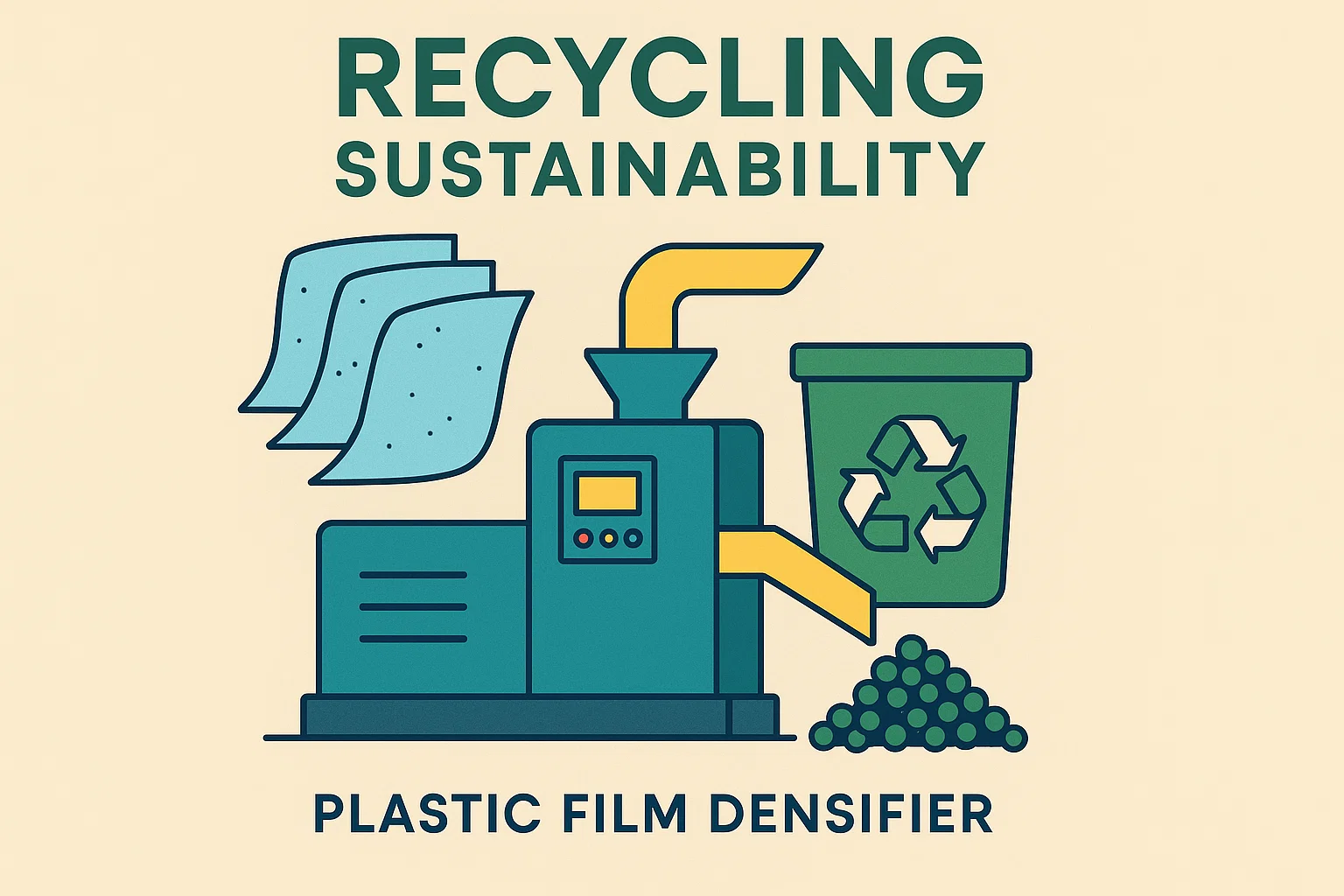In today’s fast-paced industrial landscape, the challenge of managing waste plastic films has become a critical concern for manufacturers and recycling professionals across the USA and Europe. From agricultural mulch to packaging films and shopping bags, these materials are ubiquitous, yet their disposal often leads to environmental strain and operational inefficiencies. Enter the plastic film densifier—a game-changing piece of equipment designed to transform bulky, wet waste into compact, reusable granules. At Energycle Machine, we specialize in innovative recycling solutions that empower businesses to achieve sustainability goals while optimizing costs. This comprehensive guide explores the ins and outs of plastic film densifiers, highlighting their role as the best solution for recycling waste plastic films like agricultural mulch, packaging films, and shopping bags.
As global regulations tighten on plastic waste—such as the EU’s Circular Economy Action Plan and the USA’s growing state-level recycling mandates—adopting advanced technologies like those from Energycle Machine is essential. Our systems not only reduce waste volume but also enhance material quality for downstream processing, making them indispensable for industry professionals seeking reliable, high-performance equipment.
What is a Plastic Film Densifier?
A plastic film densifier is a specialized machine used in the recycling industry to process thermoplastic films, such as polyethylene (PE) and polypropylene (PP), by compressing and heating them to create denser, more manageable forms. Unlike traditional recycling methods that might involve simple baling or landfilling, densifiers actively shred, dewater, and agglomerate the material, preparing it for extrusion or pelletizing.
The core purpose of a plastic film densifier is to address the inherent challenges of plastic films: their low density, high volume, and often high moisture content from washing or outdoor exposure. By fusing the films into granules or logs just below their melting point, these machines achieve a volume reduction of up to 90%, significantly lowering transportation and storage costs. This process preserves the material’s properties, allowing it to be reused in manufacturing new products, from packaging to construction materials.
Energycle Machine’s plastic film densifiers stand out for their robust design, tailored for heavy-duty industrial use. Built with durable components like high-torque screws and efficient heating elements, our equipment ensures consistent output even in demanding environments. For buyers in the USA and Europe, where energy efficiency and compliance with standards like ISO 14001 are priorities, these machines offer a blend of reliability and innovation.
How Does a Screw Press Densifier Work for Dewatering Wet Films?
One of the most effective types of plastic film densifiers is the screw press system, particularly suited for handling wet films. Traditional methods, such as air drying or centrifugal dewatering, often fall short with moisture-laden materials, leading to inefficiencies and higher energy use. In contrast, a screw press densifier combines mechanical squeezing with controlled heating to achieve superior results.
Equipment Workflow Illustration
To provide clarity, let’s break down the workflow of a screw press densifier in a step-by-step process. This sequential approach ensures thorough dewatering and densification, making it ideal for recycling wet plastic films from sources like agricultural fields or packaging lines.
Feeding the Material: Wet plastic films, such as washed agricultural mulch or shopping bags, are fed into the machine’s hopper. A conveyor or manual loading system ensures a steady input, preventing clogs and maintaining efficiency.
Initial Shredding (Optional): For larger or tangled films, an integrated shredder reduces the material into smaller pieces, facilitating easier processing.
Screw Press Dewatering: The heart of the system—a variable-pitch screw—rotates within a barrel, applying increasing pressure to squeeze out water. As the screw advances, it compresses the films against a perforated screen or die, expelling moisture through hydraulic force. This step can reduce water content from as high as 30% to less than 3-5%, far outperforming traditional centrifuges that might leave 10-15% residual moisture.
Heating and Densifying: The dewatered films then enter a heating zone where friction and external heaters soften the material just below its melting point (typically 100-150°C for PE films). This fuses the films into dense granules or semi-molten masses without full liquefaction, saving energy compared to extruders that require higher temperatures.
Granulation and Cooling: The densified output is cut into uniform granules using rotating blades, then cooled via air or water to solidify. The result is compact, high-density pellets ready for sale or further processing.
Output and Collection: Granules are discharged into bins or bags, with automated controls monitoring throughput for optimal performance.
This workflow, as implemented in Energycle Machine’s screw press densifiers, minimizes downtime and maximizes throughput, often handling 300-1000 kg/hour depending on the model. For visual reference, imagine a linear diagram showing material flow from wet input to dry output, with arrows indicating pressure and heat application points.
Applications and Case Studies in Recycling Waste Plastic Films
Plastic film densifiers find widespread use in diverse scenarios, particularly for recycling waste from agriculture, packaging, and consumer goods. These applications demonstrate their versatility and effectiveness as the best solution for waste plastic film recycling.
Agricultural Mulch Films
In the USA’s Midwest farmlands and Europe’s intensive agriculture regions like Spain and Italy, mulch films protect crops but generate massive waste post-harvest. Wet from soil and irrigation, these films are challenging to recycle traditionally. A screw press densifier excels here by dewatering and compacting them efficiently.
Case Study: A large agribusiness in California adopted Energycle Machine’s densifier to process 500 tons of LDPE mulch annually. Previously reliant on landfilling, they reduced waste volume by 85% and sold the granules to manufacturers, generating $50,000 in annual revenue while complying with state recycling laws. This not only cut disposal costs but also supported sustainable farming practices.
Packaging Films and Shopping Bags
Packaging films from e-commerce and retail, along with shopping bags, dominate urban waste streams in cities like New York and London. These materials, often contaminated with labels or residues, benefit from densification to improve purity and value.
Case Study: A European packaging recycler in Germany integrated a screw press densifier into their line for handling mixed PE/PP films. The system dewatered wet batches from washing, increasing pellet quality and boosting throughput by 40% over manual methods. As a result, they expanded operations, recycling 1,200 tons yearly and reducing carbon emissions equivalent to removing 200 cars from the road.
Energycle Machine’s solutions shine in these scenarios, offering customizable features like adjustable screw speeds to handle varying film thicknesses.
Benefits of Plastic Film Densifiers: Performance and Efficiency Comparison
Adopting a plastic film densifier brings multifaceted benefits, from environmental to economic. Compared to traditional methods like baling or simple drying, densifiers offer superior efficiency.
Key Benefits
- Volume Reduction and Cost Savings: Achieve up to 90% compression, slashing transportation costs by 70-80%.
- Energy Efficiency: Operate at lower temperatures than extruders, using 20-30% less power.
- Environmental Impact: Promote mechanical recycling, cutting greenhouse gas emissions by 8-23% per ton processed versus incineration.
- Material Quality: Preserve resin integrity, yielding higher-value recyclates.
| Aspect | Plastic Film Densifier (Screw Press) | Traditional Methods (Centrifuge + Air Drying) |
|---|---|---|
| Moisture Reduction | <3–5% residual moisture | 10–15% residual moisture |
| Energy Consumption | Low (friction-based heating) | High (separate drying units) |
| Throughput | 300–1000 kg/hour | 100–500 kg/hour |
| Volume Reduction | 80–90% | 50–70% |
| Cost per Ton Processed | $50–100 | $150–250 |
| Suitability for Wet Films | Excellent (integrated dewatering) | Poor (requires pre-drying) |
Technical Insights and Innovations from Energycle Machine
At Energycle Machine, we prioritize technical precision in our plastic film densifiers. Our systems feature advanced PLC controls for real-time monitoring, ensuring consistent granule size (2-5mm) and density (300-500 kg/m³). Innovations like patented screw designs minimize wear and handle contaminants effectively, extending machine life to over 10 years with proper maintenance.
For industry buyers, our equipment complies with CE and UL standards, making it seamless for USA and European markets. We also offer modular upgrades, such as integrated shredders, to adapt to specific needs like processing high-moisture agricultural films.
FAQ: Common Questions About Plastic Film Densifiers
What types of plastic films can a densifier handle?
Primarily PE and PP films, including agricultural mulch, packaging, and shopping bags. Energycle Machine’s models are versatile for both clean and contaminated inputs.How much maintenance does a screw press densifier require?
Minimal—routine checks on screws and heaters suffice. Our systems include self-cleaning features to reduce downtime.Is it cost-effective for small-scale operations?
Yes, with models starting at 300 kg/hour, ROI can be achieved in 1-2 years through reduced waste fees and material sales.How does it impact the environment?
By enabling recycling, it reduces landfill use and emissions, aligning with sustainability goals in the USA and Europe.
Conclusion: Partner with Energycle Machine for Your Recycling Needs
In summary, a plastic film densifier represents the best solution for recycling waste plastic films, offering unmatched efficiency in dewatering and densifying materials like agricultural mulch, packaging films, and shopping bags. Energycle Machine’s commitment to innovation ensures our equipment not only meets but exceeds industry standards, helping manufacturers and professionals build a greener future.
Ready to revolutionize your recycling process? Contact Energycle Machine today to learn more about our Plastic Film Squeezer Densifier System and request a customized quote. Let’s turn your waste into value—together.



